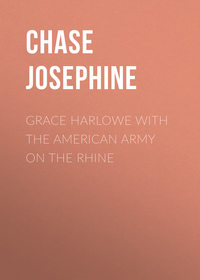 полная версия
полная версияMarjorie Dean, High School Junior
“Your head’s on the same level plane with Marjorie’s, Connie,” agreed Jerry. “I think, too, that Rowena Farnham would be apt to make blunders if she got good and mad. Speaking of getting mad reminds me that Lucy Warner is pouting about those suits of ours. She told Harriet to-day that she thought they were simply hideous. Harriet said that she wouldn’t go in with you girls when you ordered them. She considered them a waste of money. Said if she had one, she’d never get a chance to wear it. Pleasant young person, isn’t she?”
“Perhaps she couldn’t afford to have one,” remarked Constance thoughtfully. “You know her mother is a widow and supports the two of them by doing plain sewing. I imagine they must be quite poor. They live in a tiny house on Radcliffe Street, and Lucy never goes to even the high school parties, or to Sargent’s, or any place that costs money. She is a queer little thing. I’ve tried ever so many times to be nice to her, but she always snubs me. Maybe she thinks I’m trying to patronize her. I can’t help feeling sorry for her. You see I know so well what it means to be very poor – and proud,” ended Constance, flushing.
“She’s a born grouch,” asserted Jerry. “She’s been one ever since I’ve known her. Even in grammar school she was like that. She’s always had a fixed idea that because she’s poor everyone looks down on her. It’s too bad. She’s very bright in her studies, and she’d be quite pretty if she didn’t go around all the time looking ready to bite.”
“Isn’t it funny?” mused Marjorie. “I’ve never noticed her particularly or thought much about her until she made the team as a sub. Since then I’ve tried several times to talk to her. Each time she has acted as though she didn’t like to have me speak to her. I thought maybe she might be a friend of Mignon’s. But I suppose it’s just because she feels so ashamed of being poor. As if that mattered. We ought to try to make her think differently. She must be terribly unhappy.”
“I doubt it,” contradicted Jerry. “Some people enjoy being miserable. Probably she’s one of that sort. As I said before, ‘it’s too bad.’ Still, one doesn’t care to get down on one’s knees to somebody, just because that somebody hates herself. She can’t expect people are going to like her if she keeps them a mile away from her.”
“You are both right,” commented Constance. “She ought to be made to understand that being poor isn’t a crime. But you can’t force that into her head. The only way to do is to wait until a chance comes to prove it to her. We must watch for the psychological moment.” Her droll utterance of the last words set her listeners to giggling. Miss Merton was prone to dwell upon that same marvelous psychological moment.
That evening, as Marjorie diligently studied her lessons, the queer, green-eyed little junior again invaded her thoughts. A vision rose of her thin, white face with its pointed chin, sensitive, close-lipped mouth, and wide eyes of bluish-green that frequently changed to a decided green. What a curious, secretive face she had. Marjorie wondered how she had happened to pass by so lightly such a baffling personality. She charitably determined to make up for it by learning to know the true Lucy Warner. She upbraided herself severely for having been so selfish. Absorbed in her own friends, she had neglected to think of how much there was to be done to make the outsiders happy.
Entering the study hall on Monday morning she cast a swift glance toward Lucy’s desk. She was rather surprised to note that the blue-green eyes had come to rest on her at the same instant. Marjorie smiled and nodded pleasantly. The other girl only continued to stare fixedly at her, but made no answering sign. Forewarned, Marjorie was not specially concerned over this plain snub. She merely smiled to herself and decided that the psychological moment had evidently not yet arrived.
Slipping into her seat she was about to slide her books into place on the shelf under her desk, when one hand came into contact with something that made her color rise. She drew a sharp breath as she brought it to light. So the Observer was at work again! With a sudden, swift movement of her arm she shoved her find back to cover. Casting a startled look about the study hall, she wondered if whoever had placed it there were now watching her. Strangely enough, the only pair of eyes she caught fastened upon her belonged to Mignon La Salle. In them was a light of brooding scorn, which plainly expressed her opinion of Marjorie.
“Could Mignon be the mysterious Observer?” was again the question that assailed Marjorie’s mind. She longed to read the letter, but her pride whispered, “not now.” She would save it until school was over for the day. She and Captain would read it together in the living room.
It was a long, weary day for the impatient little girl. At noon she carried the dread missive home with her, gravely intrusting it to her Captain’s keeping. “It’s another stab from the Observer,” she explained soberly. “I haven’t opened it. We will read it together when I come home this afternoon. I don’t care to read it now.”
She returned home that afternoon to find her mother entertaining callers. Despite her feverish impatience to have the thing over, she was her usual charming self to her mother’s friends. Nevertheless, she sighed with relief when she saw them depart. Seating herself on the davenport she leaned wearily against its cushioned back. The suspense of not knowing had told severely upon her.
“Now, Lieutenant, I think we are ready,” said Mrs. Dean cheerily. Taking the letter from a drawer of the library table, she sat down beside Marjorie and tore open the envelope. Her head against her Captain’s shoulder, Marjorie’s eyes followed the Observer’s latest triumph in letter writing:
“Miss Dean:
“Last Saturday showed very plainly that you could not play basket ball. I knew this long ago. Several others must now know it. It would serve you right if you were asked to resign from the team. If you had been thinking less about yourself and more about the game, you might have tied the score and not disgraced the juniors. You are a menace to the team and ought to be removed from it. As I am not alone in this opinion, I imagine and sincerely hope that you will soon receive your dismissal. If you had any honor in you, you would resign without waiting to be asked. But remember that a coward is soon worsted in the fight. Prepare to meet the inevitable.
“The Observer.”Without speaking, Marjorie turned again to the first page of the letter, re-reading thoughtfully the entire communication. “This letter tells me something which the others didn’t,” she said.
“It tells me that it is high time to stop such nonsense.” Mrs. Dean’s tones conveyed righteous indignation. “The whole thing is simply outrageous.”
“It can’t be stopped until we know who is writing these letters,” reminded Marjorie. “But I think I have a tiny clue. That sentence about disgracing the juniors would make it seem that a junior wrote them. No one would mention it who wasn’t a junior. I’ve tried not to believe it, but now I am almost certain that Mignon wrote them. She would like more than anyone else to see me lose my place on the team. Yes, Mignon and the Observer must be very closely related.”
CHAPTER XVII – IN TIME OF NEED
Three days later Marjorie’s theory seemed destined to prove itself correct. Ellen Seymour came to her, wrath in her eye. “See here, Marjorie,” she burst forth impulsively, “if Miss Davis sends for you to meet her in the gym after school, let me know. I’m going there with you. Yesterday while you girls were at practice she stood there watching you. Do you remember?”
“Yes. I noticed her. She stared at me so hard she made me nervous and I played badly. She has always had that effect on me. Last year when she managed the team she was fond of watching me. She used to criticize my playing, too, and call out one thing to me just when I knew I ought to do another. She was awfully fussy. I hope she isn’t going to begin it again this year. I thought she had left everything to you.”
“So did I,” retorted Ellen grimly. “It seems she hasn’t. Someone, you can guess who, went to her after the game and said something about your playing. She came to me and said: ‘I understand there is a great deal of dissatisfaction on the part of the juniors over Miss Dean’s being on the junior team.’ You can imagine what I said. When I saw her in the gym after school I knew she had an object. But leave things to me. I know a way to stop her objections very quickly. If she sends for you, go straight to the junior locker room from the study hall and wait there for me. If she doesn’t send for you, then you’ll know everything is all right. Remember now, don’t set foot out of that locker room until I come for you.” With this parting injunction Ellen hurried off, leaving Marjorie a victim to many emotions.
So the Observer’s, or rather Mignon’s, prophesy bordered on fulfillment. Mignon and the few juniors who still adhered to the La Salle standard had made complaint against her to Miss Davis in the name of the junior class. As a friend of Miss Merton, Miss Davis had always favored the French girl. Last year it had been whispered about that her motive in creating a second sophomore team had arisen from her wish to help Mignon’s fortunes along. No doubt she had been very glad to listen to this latest appeal on Mignon’s part.
But Marjorie was only partially correct in her conclusions. Though it was, indeed, true that Mignon had besieged Miss Davis with a plea that Marjorie be removed from the team, no other member of the junior class had accompanied her. She was flanked by the far more powerful allies, Charlotte Horner and Rowena Farnham. The plan of attack had originated in Rowena’s fertile brain as the result of a bitter outburst against Marjorie on Mignon’s part. It was directly after the game that she had stormed out her grievances to Rowena and Charlotte. Personally, Rowena cared little about Mignon’s woes. Her mischief-making faculties were aroused merely on Marjorie’s account. Had it been Susan, or Muriel against whom Mignon raved she would have laughed and dubbed her friend, “a big baby.” But Marjorie – there was a chance to even her score.
“You just let me manage this,” Rowena had declared boastfully. “This Miss Davis is easy. She’s a snob. So is Miss Merton. If they weren’t they’d have put you in your place long ago. They can see through you. It’s money that counts with both of them. I’ve made it a point right along to be nice to Miss Davis. In case that frosty Miss Seymour tried to make trouble for me, I knew I needed a substantial backing. Now I’ll ask her to my house to dinner to-morrow night. If she can’t come, so much the better for me. If she can, so much the better for you. Of course you’ll be there, too. Then we’ll see what we can do. You ought to be very grateful to me. I expect she’ll bore me to death. I’m only doing it for your sake.”
Rowena was too crafty not to hang the heavy mantle of obligation on Mignon’s shoulders. Thus indebted to her, Mignon would one day be reminded of the debt. As a last perfect touch to her scheme she had shrewdly included Charlotte Horner in the invitation. Providentially for Mignon, Miss Davis had no previous engagement. So it fell about that Rowena became hostess to three guests. At home a young despot, who bullied her timid little mother and coaxed her indulgent father into doing her will, she merely announced her intention to entertain at dinner and let that end it. The final results of that highly successful dinner party were yet to be announced.
Unwittingly, however, Miss Davis had blundered. In order to strengthen her case she had purposely complained of Marjorie to Ellen Seymour. Knowing nothing of Ellen’s devotion to the pretty junior, she had not dreamed that Ellen would set the wheels in motion to defeat her. She was in reality more to be pitied than blamed. Of a nature which accepted hearsay evidence, declining to go below the surface, it is not to be wondered at that Rowena’s clever persuasion, backed by Mignon’s and Charlotte’s able support, caused her to spring to the French girl’s aid. She was one of those aggravating persons who refuse to see whatever they do not wish to see. She was undoubtedly proficient in the business of physical culture. She was extremely inefficient in the art of reading girls. Sufficient unto herself, she, therefore, felt no compunction in sending forth the word that should summon Marjorie to the gymnasium, there to be deprived of that which she had rightfully earned.
Like many other days that had come to poor Marjorie since the beginning of her junior year, suspense became the ruling power. Two things she knew definitely. Ellen Seymour was for her. Miss Davis against her. The rest she could only guess at, losing herself in a maze of troubled conjecture. Judge her surprise when on reaching the locker room, she found not only Ellen awaiting her, but her teammates as well. They had made a most precipitate flight from the study hall in order to be in the locker room when she arrived.
“Why, Ellen! Why, girls!” she stammered. A deeper pink rushed to her cheeks; a mist gathered in her eyes as she realized the meaning of their presence. They had come in a body to help her.
“We’re here because we’re here,” trilled Captain Muriel Harding. “In a few minutes we’ll be in the gym. Then someone else will get a surprise. Are we ready to march? I rather think we are. Lead the procession, Ellen.”
“Come on, Marjorie, you and I will walk together. Fall in, girls. The invincible sextette will now take the trail.”
Amid much laughter on their part and openly curious glances from constantly arriving juniors who wondered what was on foot, the six girls had swung off down the corridor before the curious ones found opportunity to relieve their curiosity.
“She’s not here yet,” commented Susan, as they entered the place of tryst. “Isn’t that too bad. I hoped she’d be on hand to see the mighty host advancing.”
“Here she comes,” warned Rita Talbot. “Now, for it.”
CHAPTER XVIII – DOING BATTLE FOR MARJORIE
Two spots of angry color appeared high up on Miss Davis’s lean face as she viewed the waiting six. It came to her that she was in for a lively scene. Setting her mouth firmly, she approached them. Addressing herself to Marjorie, she opened with: “I sent for you, Miss Dean; not your friends.”
“I asked these girls to come here.” Ellen Seymour turned an unflinching gaze upon the nettled instructor.
“Then you may invite them into one of the dressing rooms for a time. My business with Miss Dean is strictly personal.”
“I am quite willing that my friends should hear whatever you have to say to me.” Marjorie’s brown head lifted itself a trifle higher.
“But I am not willing that they should listen,” snapped Miss Davis.
“Then I must refuse to listen, also,” flashed the quick, but even response.
“This is sheer impudence!” exclaimed Miss Davis. “I sent for you and I insist that you must stay until I give you permission to go. As for these girls – ”
“These girls will remain here until Marjorie goes,” put in Ellen, admirably self-controlled. “Everyone of them knows already why you wish to see Marjorie Dean. She knows, too. We have come to defend her. I, for one, say that she shall not be dismissed from the team. Her teammates say the same. It is unfair.”
“Have I said that she was to be dismissed from the team?” demanded Miss Davis, too much irritated to assert her position as teacher. Ellen’s blunt accusation had robbed her of her usual show of dignity.
“Can you say that such was not your intention?” cross-questioned Ellen mercilessly.
Miss Davis could not. She looked the picture of angry guilt. “I shall not answer such an impertinent question,” she fumed. “You are all dismissed.” Privately, she determined to send for Marjorie the next day during school hours.
“Very well.” Ellen bowed her acceptance of the dismissal. “Shall we consider the matter settled?”
“Certainly not.” The words leaped sharply to the woman’s lips. Realizing she had blundered, she hastily amended. “There is no matter under consideration between you and me.”
“Whatever concerns Marjorie’s basket ball interests, concerns me. If you send for her again she will not come to you unless we come with her. Am I not right?” She appealed for information to the subject of the discussion.
“You are,” was the steady reply.
“This is simply outrageous.” Miss Davis completely lost composure. “Do you realize all of you that you are absolutely defying your teacher? Miss Dean deserves to be disciplined. After such a display of discourtesy I refuse to allow her the privilege of playing on the junior basket ball team.” Miss Davis continued to express herself, unmindful of the fact that Muriel Harding had slipped away from the group and out of the nearest door. Her temper aroused she held forth at length, ending with: “This disgraceful exhibition of favoritism on your part, Miss Seymour, shows very plainly that you are not fitted to manage basket ball in this school. I shall replace you as manager to-morrow. You, Miss Dean, are dismissed from the junior team. I shall report every one of you to Miss Archer as soon as I leave the gymnasium.”
“I believe she is on her way here now,” remarked Ellen with satirical impersonality. “Muriel went to find her and ask her to come.”
“What!” Miss Davis betrayed small pleasure at this news. Quickly recovering herself she ordered: “You may go at once.”
“Here she is.” Ellen nodded toward a doorway through which the principal had just entered, Muriel only a step behind her. The senior manager’s eyes twinkled satisfaction.
“What seems to be the trouble here, Miss Davis?” The principal came pithily to the point.
“I have been insulted by these disrespectful girls.” Miss Davis waved a hand toward the defending sextette.
“That is news I do not relish hearing about my girls. I wish every teacher in this school to be treated with respect. Kindly tell me what reason they gave for doing so.”
“I sent for Miss Dean on a personal matter. She insisted on bringing these girls with her. I requested them to leave me alone with Miss Dean. They refused to do so. I dismissed them all, intending to put off my interview with Miss Dean until to-morrow. Miss Seymour took it upon herself to tell me that Miss Dean would not come to me to-morrow unless accompanied by herself and these girls. Miss Dean declared the same thing. Such conduct is unendurable.”
“These young women must have strong reason for such peculiar conduct, or else they have overstepped all bounds,” decided Miss Archer impassively. “What have you to say for yourself, Ellen? As a member of the senior class I shall expect a concise explanation.”
“We have a very strong reason for our misbehavior.” Ellen put a questioning inflection on the last word. “Briefly explained, it is this. Miss Davis has been influenced by certain persons to dismiss Marjorie Dean from the junior basket ball team. Because the juniors lost the game the other day by two points, the blame for it has been unjustly placed upon Marjorie. At practice yesterday she did not play as well as usual. These are, apparently, the very shaky causes for her dismissal. I shall not attempt to tell you the true reasons. They are unworthy of mention. As her manager I refused to countenance such unfairness. So did her teammates. They will agree with me when I say that Marjorie is one of the best players we have ever had at Sanford High. We are all in position to say so. We know her work. So we came with her to defend her. I admit that we took a rather stiff stand with Miss Davis. There was no other way.”
“What are your reasons for dismissing Miss Dean from the team?” Still impassive of feature, the principal now addressed Miss Davis.
“I have received complaints regarding her work,” came the defiant answer.
“According to Ellen these complaints did not proceed from either herself or her teammates. If not from them, whom could it interest to make complaint?” continued the inexorable questioner.
“The members of the junior class are naturally interested in the team representing them,” reminded Miss Davis tartly.
“How many members of the junior class objected to Miss Dean as a player?” relentlessly pursued Miss Archer.
Miss Davis grew confused. “I – they – I decline to talk this matter over with you in the presence of these insolent girls,” she hotly rallied.
“A word, girls, and you may go. I am greatly displeased over this affair. Since basket ball seems to be such a trouble-breeder, it might better be abolished in this school. I may decide to take that step. Desperate diseases require desperate remedies. You will hear more of this later. That will be all at present.”
With the feeling that the gymnasium roof was about to descend upon them, the six girls quitted the battlefield.
“Don’t you ever believe Miss Archer will stop basket ball,” emphasized Muriel Harding when they were well down the corridor. “She knows every single thing about it. I told her in the office. I told her, too, that I knew Rowena Farnham and Charlotte Horner were mixed up in it. They’ve had their heads together ever since the game.”
“I would have resigned in a minute, but I just couldn’t after the way you girls fought for me,” Marjorie voiced her distress. “If Miss Archer stops basket ball it will be my fault. I’m sorry I ever made the team.”
“You couldn’t help yourself.” Ellen Seymour was rapidly regaining her cheerfulness. “Don’t think for a minute that Miss Davis will be able to smooth things over. Miss Archer is too clever not to recognize unfairness when she meets it face to face. And don’t worry about her stopping basket ball. Take my word for it. She won’t.”
CHAPTER XIX – WHAT JERRY MACY “DUG UP”
As Ellen Seymour had predicted, basket ball did not receive its quietus. But no one ever knew what passed between Miss Archer and Miss Davis. The principal also held a long session with Ellen, who emerged from her office with a pleased smile. To Marjorie and her faithful support Ellen said confidentially: “It’s all settled. No one will ever try to shove Marjorie off the team while Miss Archer is here. But basket ball is doomed, if anything else like that ever comes up. Miss Archer says so.” Strangely enough the six girls were not required to apologize to Miss Davis. Possibly Miss Archer was not anxious to reopen the subject by thus courting fresh rebellion. After all, basket ball was not down on the high school curriculum. She was quite willing her girls should be at liberty to manage it as they chose, provided they managed it wisely and without friction. Privately, she was disgusted with Miss Davis’s part in the recent disagreement. She strongly advised the former to give up all claim to the management of the teams. But this advice Miss Davis refused to take. She still insisted on keeping up a modified show of authority, but resolved within herself to be more careful. She had learned considerable about girls.
The three plotters accepted their defeat with bad grace. Afraid that the tale would come to light, Mignon and Charlotte privately shoved the blame on Rowena’s shoulders. Nothing leaked out, however, and they were too wise to censure Rowena to her face. Mignon soon discovered that the obliging sophomore’s efforts in her behalf had cost her dear. Rowena tyrannized over her more than ever. After the second game between the junior and sophomore teams, which occurred two weeks after Marjorie’s narrow escape from dismissal from the team, Mignon came into the belief that her lot was, indeed, hard. The sophomores had been ingloriously beaten, the score standing 22-12 in favor of the juniors. In consequence Rowena was furious, forcing Mignon to listen to her long tirades against the juniors, and rating her unmercifully when she failed to register proper sympathy.
Owing to the nearness of the Christmas holidays and the brief stretch that lay between them and the mid-year examinations, the other two games were put off until February and March, respectively. No one except Rowena was sorry. She longed for a speedy opportunity to wipe the defeat off her slate. She had little of the love of holiday giving in her heart, and was heard loudly to declare that Christmas was a nuisance.
Marjorie and her little coterie of intimates regarded it very differently. They found the days before Yule-tide altogether too short in which to carry out their Christmas plans. With the nearness of the blessed anniversary of the world’s King, Marjorie grew daily happier. Since the straightening of the basket ball tangle, for her, things in school had progressed with surprising smoothness. Then, too, the hateful Observer had evidently forgotten her. Since the letter advising her to “prepare to meet the inevitable,” the Observer had apparently laid down her pen. Marjorie soberly confided to her captain that she hoped Christmas might make the Observer see things differently.









